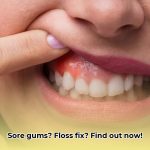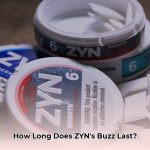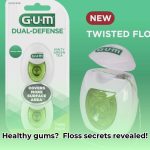ZYN pouches are increasingly popular as a smokeless nicotine alternative. But are they truly harmless? This comprehensive guide explores the impact of ZYN on gum health, debunking the myth of its harmlessness and providing practical advice for protecting your smile.
ZYN and Gum Health: Separating Fact from Fiction
Many assume that ZYN, being smokeless, spares the gums the damage of traditional tobacco. This is a misconception. While ZYN eliminates the harmful chemicals associated with combustion, the nicotine it delivers poses significant risks to oral health.
The Nicotine Problem
Nicotine, regardless of its delivery method, constricts blood vessels. This vasoconstriction reduces blood flow to the gums, depriving them of essential oxygen and nutrients. Weakened gums are more susceptible to infection, heal slower, and are prone to recession. Additionally, the physical presence of the pouch against the gum tissue can cause irritation and abrasion, further exacerbating these issues.
Potential Gum Risks and Symptoms
The effects of ZYN on gum health can manifest in several ways:
- Gingivitis: Early-stage gum disease characterized by red, swollen, and bleeding gums. Nicotine’s interference with blood flow makes it harder for the body to fight the bacteria that cause gingivitis.
- Periodontitis: A severe gum infection that damages the supporting tissues and bones of the teeth. Untreated gingivitis can progress to periodontitis, potentially leading to tooth loss. Nicotine weakens the gums’ defenses, increasing the risk of this serious condition.
- Gum Recession: The gums pull back from the teeth, exposing the sensitive root surfaces. This can result in increased tooth sensitivity, especially to hot and cold temperatures, and a higher risk of cavities. Nicotine-induced vasoconstriction and the physical irritation from the pouch can both contribute to gum recession.
- Leukoplakia: White patches inside the mouth. While leukoplakia is often benign, some patches can be precancerous. Although more research is needed, some studies suggest a possible link between nicotine use and the development of leukoplakia.
- Xerostomia (Dry Mouth): Nicotine can reduce saliva production. Saliva plays a crucial role in washing away food particles and bacteria, protecting against cavities and other oral health issues. Reduced saliva flow can exacerbate existing gum problems and make the mouth more susceptible to infection.
- Delayed Healing: Nicotine impairs the body’s natural healing processes, making it harder for gum tissues to recover from injury or infection. This can prolong the duration and severity of gum problems.
Recognizing the Signs
Regular self-exams can help you detect early signs of gum issues. Look for:
- Red, swollen, or tender gums
- Bleeding gums, especially when brushing or flossing
- Receding gums, making teeth appear longer
- White patches inside the mouth (leukoplakia)
- Persistent bad breath or a bad taste in your mouth
- Loose teeth or changes in your bite
Protecting Your Gum Health: A Step-by-Step Guide
- Oral Hygiene Essentials: Brush twice daily with fluoride toothpaste, floss daily, and consider using an antimicrobial mouthwash. These practices remove plaque and bacteria, which are key contributors to gum disease.
- Hydration is Key: Drink plenty of water. Staying hydrated helps combat dry mouth, a common side effect of nicotine use that can worsen gum problems.
- Regular Dental Checkups: Schedule professional cleanings and checkups more frequently than the typical twice-yearly visits. Your dentist can detect early signs of gum disease and provide personalized advice.
- Self-Exams: Perform regular oral self-exams. Follow the steps outlined above to monitor your gum health and identify any changes that warrant professional attention.
- Modify ZYN Habits (If Applicable): If you’re not ready to quit ZYN, try rotating the pouch’s placement to avoid constant irritation in one area. Consider reducing your frequency of use or switching to a lower nicotine strength product. Do not exceed the recommended usage time.
- Consider Quitting: Quitting nicotine altogether is the best way to protect your gums and overall oral health. Consult your doctor or dentist for guidance and support. They can recommend appropriate strategies and resources, such as nicotine replacement therapy (NRT) like patches, gum, or lozenges, to help you quit successfully. Quitting resources are also available through organizations like the American Cancer Society and the National Cancer Institute.
ZYN vs. Other Nicotine Products
ZYN, while smokeless, still delivers nicotine directly to the gums, increasing the risk of irritation and related problems. Nicotine gum and lozenges, while also containing nicotine, are typically used for shorter periods and can be less irritating when used as directed. Furthermore, unlike ZYN, nicotine gum and lozenges are FDA-approved for smoking cessation. This approval signifies that they have undergone rigorous testing for safety and efficacy in helping people quit smoking. It’s important to remember that no form of nicotine is completely safe, and consulting a healthcare professional is crucial for making informed decisions about nicotine use.
The Importance of Professional Guidance
This information is for educational purposes only and is not a substitute for professional medical advice. Consult your dentist or doctor for personalized guidance and treatment. They can assess your individual risk factors, discuss the potential effects of nicotine on your oral health, and help you make the best decisions for your specific needs. Remember, maintaining healthy gums is vital for a healthy smile.
- Best Mindfulness Books for Anxiety, Sleep, and Daily Peace - January 29, 2026
- Books On Mindfulness For A Happier, More Present Life - January 28, 2026
- Essential Meditation Books for Beginners and Experienced Practitioners - January 27, 2026
















